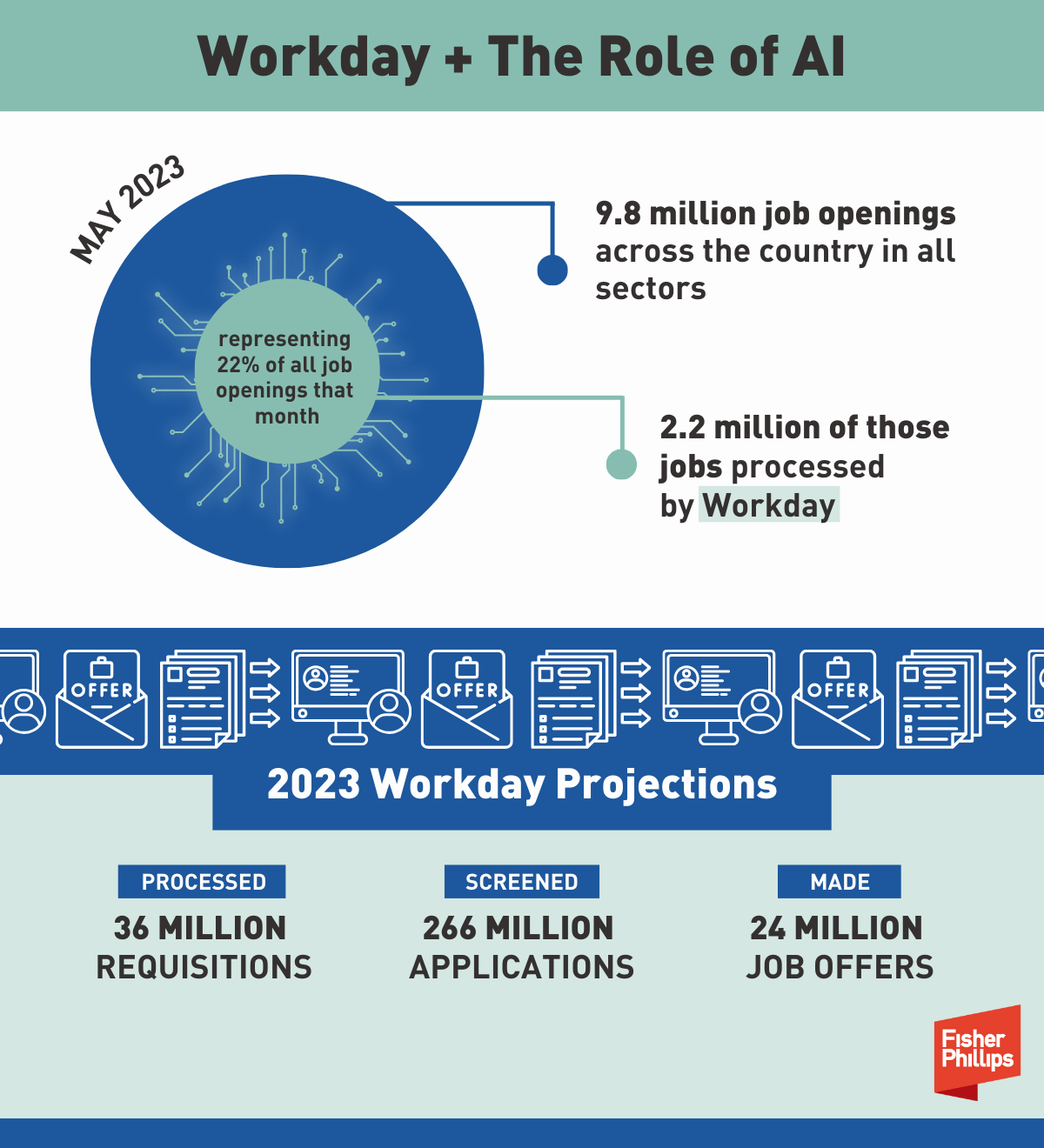Job Applicant Seeks to Expand AI Workplace Screener Lawsuit into a National Class Action: Should Employers and AI Developers Be Worried?
Insights
2.14.25
A frustrated job applicant who won court approval to advance his employment discrimination lawsuit against an AI-based vendor is now looking to ratchet up the pressure and expand his claim into a national class action. His initial argument: Workday’s AI screening tools unfairly led him to be rejected from hundreds of jobs because of his race, age, and disability status. His new argument? Millions of applicants over the age of 40 who were also rejected by Workday’s AI system since September 2020 should be able to join his federal claim. What do employers and AI developers need to know about this February 6 court filing and what it means for the future of AI hiring?
Quick Background: AI Lawsuit Got the Green Light
It’s important to remember that this case is in the early stages of litigation, and Workday hasn’t even had a chance to provide evidence to refute the allegations – so take these points with a grain of salt and recognize that they may even be proven false.
- Derek Mobley is a Black man over the age of 40 who self-identifies as having anxiety and depression. He says he applied to more than 100 jobs with companies that use Workday’s AI-based hiring tools over the course of several years – and says he was rejected every single time.
- Thousands of companies use Workday’s AI-based applicant screening tools, which include personality and cognitive tests. They then interpret a candidate’s qualifications through advanced algorithmic methods and can automatically reject them or advance them along the hiring process.
- After Mobley filed a claim in a California federal court, Workday asked to have the case dismissed since it wasn’t the employer making the employment decisions. After over a year of procedural wrangling, a California federal judge gave the green light for Mobley to continue his lawsuit in July 2024.
- You can read more about his initial lawsuit in our Insight here.
What’s New?
Mobley had always intended to proceed with a class action claim, seeking to represent all applicants like him who weren’t hired because of the alleged discriminatory screening process. On February 6, he took the next step in that process.
- His claim now includes four other frustrated job applicants, all over the age of 40, all of whom claim they were similarly rejected by Workday’s AI systems because of their age.
- Among them, they say they submitted over 3,000 job applications to companies that used Workday’s screening system, alleging that they were minimally qualified for each of these positions.
- They claim they were summarily rejected from every one of these jobs, sometimes within minutes after submitting the application. Several of these rejections bore a tell-tale sign of having been processed by a robot – they were sent in the middle of the night when it is unlikely that a human was screening job resumes.
- The federal filing alleges that anyone across the country over the age of 40 who was rejected by Workday’s system since September 2020 should be able to join the claim since they were subject to the same common policy or practice. They have common elements of liability – same proof of impact, same causation, same type of backpay relief – and thus would be properly grouped as a collective group of plaintiffs.
What’s Next?
Judge Rita Lin has set an April 8 hearing date to decide on the matter and determine whether Mobley’s class should be certified. This case could have a significant impact on AI hiring given the prevalence of Workday’s systems in employment settings across the country.
3 Things for Employers to Know
Even if the plaintiff’s motion fails, this case is a good reminder for employers to tread carefully when implementing AI hiring solutions. Three suggestions:
- Know What to Ask Your Vendors – Ensure your AI vendors follow ethical guidelines and have measures in place to prevent bias before you deploy the tool. This includes understanding the data they use to train their models and the algorithms they employ. This Insight reviews the right questions to ask at the outset of the relationship and along the way.
- Consider Indemnification Language – It’s not uncommon for contracts between business partners to include language shifting the cost of litigation and resulting damages from employer to vendor. But make sure you work with counsel when developing such language – public policy doesn’t often allow you to transfer the cost of discriminatory behavior to someone else unless the language is carefully constructed.
- Get Your Governance House in Order – If you haven’t established an AI Governance program to set guardrails and construct the best practices for implementing AI in your organization, the time to do so is now. This will help you monitor the outcomes of your AI hiring tools on a regular basis and ensure you have the human touch where necessary.
3 Things for AI Developers to Know
When taken in conjunction with the ongoing ACLU action against Aon Consulting for its use of AI screening platforms, this lawsuit should grab the attention of any developer of AI-based hiring tools. Here are three things to consider:
- Team With Your Lawyers – Work hand-in-hand with counsel to help ensure compliance with best practices and all relevant workplace laws – not just laws prohibiting intentional discrimination, but also those giving rise to the type of unintentional “disparate impact” claims as we see in the Workday lawsuit.
- Develop Bias Detection Mechanisms – Implement robust testing and validation processes to detect and eliminate bias in your AI systems. This includes using diverse training data and regularly updating your algorithms to address any identified biases.
- Not All Software Developers are On the Hook – This litigation doesn’t mean that all software vendors and AI developers could qualify as “agents” subject to a lawsuit like this one. If a vendor, for example, developed a spreadsheet system that simply helped employers sort through applicants, they shouldn’t be part of any discrimination lawsuit even if the employer used that system to purposefully sort the candidates by age and reject all those over 40.
Conclusion
We will continue to monitor these developments and provide the most up-to-date information directly to your inbox, so make sure you are subscribed to Fisher Phillips’ Insight System. If you have questions, contact your Fisher Phillips attorney, the authors of this Insight, or any attorney in our AI, Data, and Analytics Practice Group.
Related People
-
- Anne Yarovoy Khan
- Of Counsel


